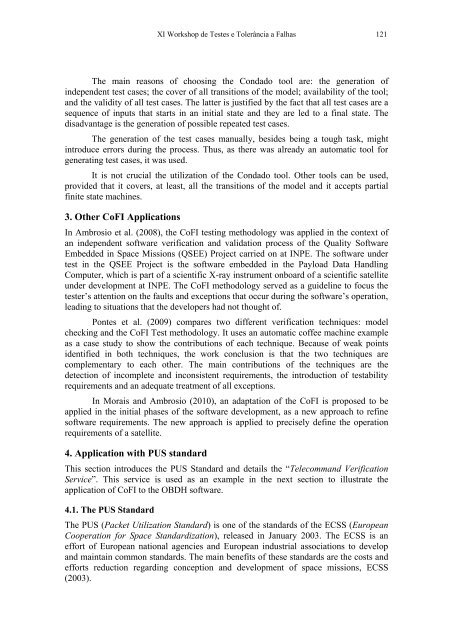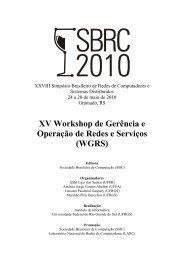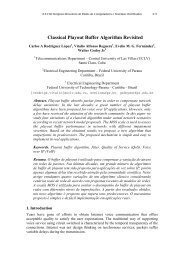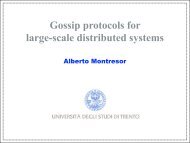XI Workshop de Testes e Tolerância a Falhas (WTF) - SBRC 2010
XI Workshop de Testes e Tolerância a Falhas (WTF) - SBRC 2010
XI Workshop de Testes e Tolerância a Falhas (WTF) - SBRC 2010
You also want an ePaper? Increase the reach of your titles
YUMPU automatically turns print PDFs into web optimized ePapers that Google loves.
<strong>XI</strong> <strong>Workshop</strong> <strong>de</strong> <strong>Testes</strong> e Tolerância a <strong>Falhas</strong> 121<br />
The main reasons of choosing the Condado tool are: the generation of<br />
in<strong>de</strong>pen<strong>de</strong>nt test cases; the cover of all transitions of the mo<strong>de</strong>l; availability of the tool;<br />
and the validity of all test cases. The latter is justified by the fact that all test cases are a<br />
sequence of inputs that starts in an initial state and they are led to a final state. The<br />
disadvantage is the generation of possible repeated test cases.<br />
The generation of the test cases manually, besi<strong>de</strong>s being a tough task, might<br />
introduce errors during the process. Thus, as there was already an automatic tool for<br />
generating test cases, it was used.<br />
It is not crucial the utilization of the Condado tool. Other tools can be used,<br />
provi<strong>de</strong>d that it covers, at least, all the transitions of the mo<strong>de</strong>l and it accepts partial<br />
finite state machines.<br />
3. Other CoFI Applications<br />
In Ambrosio et al. (2008), the CoFI testing methodology was applied in the context of<br />
an in<strong>de</strong>pen<strong>de</strong>nt software verification and validation process of the Quality Software<br />
Embed<strong>de</strong>d in Space Missions (QSEE) Project carried on at INPE. The software un<strong>de</strong>r<br />
test in the QSEE Project is the software embed<strong>de</strong>d in the Payload Data Handling<br />
Computer, which is part of a scientific X-ray instrument onboard of a scientific satellite<br />
un<strong>de</strong>r <strong>de</strong>velopment at INPE. The CoFI methodology served as a gui<strong>de</strong>line to focus the<br />
tester‟s attention on the faults and exceptions that occur during the software‟s operation,<br />
leading to situations that the <strong>de</strong>velopers had not thought of.<br />
Pontes et al. (2009) compares two different verification techniques: mo<strong>de</strong>l<br />
checking and the CoFI Test methodology. It uses an automatic coffee machine example<br />
as a case study to show the contributions of each technique. Because of weak points<br />
i<strong>de</strong>ntified in both techniques, the work conclusion is that the two techniques are<br />
complementary to each other. The main contributions of the techniques are the<br />
<strong>de</strong>tection of incomplete and inconsistent requirements, the introduction of testability<br />
requirements and an a<strong>de</strong>quate treatment of all exceptions.<br />
In Morais and Ambrosio (<strong>2010</strong>), an adaptation of the CoFI is proposed to be<br />
applied in the initial phases of the software <strong>de</strong>velopment, as a new approach to refine<br />
software requirements. The new approach is applied to precisely <strong>de</strong>fine the operation<br />
requirements of a satellite.<br />
4. Application with PUS standard<br />
This section introduces the PUS Standard and <strong>de</strong>tails the “Telecommand Verification<br />
Service”. This service is used as an example in the next section to illustrate the<br />
application of CoFI to the OBDH software.<br />
4.1. The PUS Standard<br />
The PUS (Packet Utilization Standard) is one of the standards of the ECSS (European<br />
Cooperation for Space Standardization), released in January 2003. The ECSS is an<br />
effort of European national agencies and European industrial associations to <strong>de</strong>velop<br />
and maintain common standards. The main benefits of these standards are the costs and<br />
efforts reduction regarding conception and <strong>de</strong>velopment of space missions, ECSS<br />
(2003).







